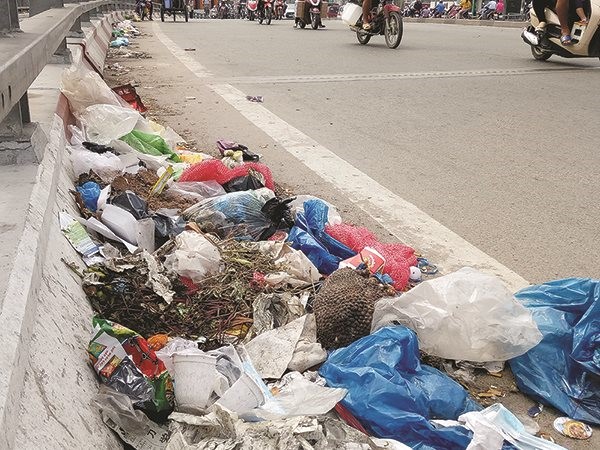
The Battle with plastic waste: Make good use of the tax “stick”
“The Battle” with single use plastic products have yet to bring about any positive results. We do not lack solutions, what is missing here is the practicality of these solutions. The lack of determination by the authorities to persevere with the right management tools leads to this war becoming an … impossible mission.
Choose economic factors as the center, but …
To deal with environmental problems in general and the current plastic bag crisis in particular, countries around the world may have different approaches, but basically, there are three solutions: (i) ban; restrictions; technical barriers; (ii) taxes and fees; price subsidy; credit; infrastructure investment; and (iii) propaganda and advocacy.
Depending on the socio-economic conditions of each country, they can choose one or a combination of approaches provided that it is the most effective way. For example, Kenya chooses a tough solution which bring criminal prosecution against those producing and consuming disposable plastic bag products. Meanwhile, in the UK, the government combined propaganda, advocacy and high taxation on every plastic bag that is put into circulation and was remarkably successful.

Back in Vietnam, through the Project of enhancing control over environmental pollution caused by the use of persistent plastic bags issued in 2013 (Project 2013), it is clear that our country chooses a multidimensional approach, in which solutions to economic factors play a central role.
However, reality shows that, for many years now, since the Government set its determination to repel the “invasion” of plastic bags with a national project, all we have achieved mostly focus on movements to campaign, propagate and raise people’s awareness of the harmful effects of plastic waste.
The amount of plastic waste discharged into the environment is still increasing steadily and rapidly, turning Vietnam into a “giant”, ranking fourth in the world in terms of the amount of plastic waste entering the ocean with 1.8 million tons/year (1).
On the contrary, although choosing the approach with economic factors as the center, of which the most important is the tax “weapon”, this kind of “weapon” has not been fully exploited.
The paradox of environmental protection tax
High taxation to reduce the production and consumption of disposable plastic products is a very practical solution and is widely applied in many countries.
Vietnam is also applying environmental protection tax as one of the most important tools to reduce the use of persistent plastic bags. However, the tax loss rate of this tax is now almost… absolute, up to more than 99% (2).
With a tax rate at 40,000 VND/kg of plastic bags produced, if collected correctly and fully, the collected amount must reach 20,000 billion VND/year. In fact, in 2017, the tax authorities of the country only earned… 54 billion VND, too small to have any impact on the behavior of the production and consumption of plastic bags (3).
Looking at these numbers, it is clear that the problem is not in the tax rate but in the efficiency of tax collection. However, instead of concentrating on finding solutions to prevent or reduce revenue losses, the tax industry thinks that environmental protection tax is still low and needs to be increased to have much effect on the production and consumption of plastic bags.
Consequently, the tax rate increases… maximum under the provisions of the Law on Environmental Protection Tax 2010, from 40,000 VND to 50,000 VND/kg of plastic bags. According to estimates by this agency, with this increase, with the current poor performance, from 2019, the national budget will only increase revenue by about… 13.5 billion VND each year (4).
The tax authority may be correct in saying that the biggest difficulty in collecting environmental protection tax on plastic bags is that up to 70% of production establishments are small households, pay presumptive taxes, do not implement or fully implement accounting, invoices, documents regime.
However, this cannot be considered as the reason for the tax loss of more than 99% mentioned above. Not to mention, in Vietnam, “dealing” with the situation of small businesses, households and not fully implementing accounting, invoices and documents regimes is not something strange to local tax officials.
In addition, no matter which tax declaration and payment regime is implemented, the declaration should reflect exactly the business establishment’s taxable business operation. Then, as the person who reviews and accepts the owner’s declaration, the tax authority must be responsible and is obliged to recover when losses occur, especially when the revenue loss occurs with such an unreasonable rate.
Here is the knot
As long as this situation of loss of environmental protection tax is not resolved, even if the tax is increased by several times, the cost of plastic bags produced will still be very low and retailers will not be under enough pressure to reduce the unreasonable discharged to the “Mother Nature”.
On the other hand, if the problem of the loss of environmental protection tax revenue is solved and the tax rate increases, definitely the price of plastic bags sold will be pushed up, forcing retailers to either seriously consider on the number of bags delivered free to customers or make consumers share the cost. This will make a significant contribution towards making people change their habits of using plastic bags and discharging them into the environment which causes pollution.
Producing environmentally friendly bags and “paddling their own canoe” in difficulty
In Project 2013, the Prime Minister asked ministries and localities to build a mechanism for supporting the production, introduction and distribution of environmentally friendly packaging products, bags substituting persistent plastic bags.
So far, however, with just over one year left for the completion of the project’s ambitious target to reduce plastic bag consumption, eco-friendly bag manufacturers are still paddling their own canoe to survive.
Because of the high cost, eco-friendly products, of course, cannot compete with cheap plastic bags. Therefore, if they want eco-friendly bag manufacturers to survive and thrive in order to repel plastic bags that are harmful to the environment, the State needs to quickly come up with and offer support solutions to these enterprises.
At the same time, increase tax on materials that make up hard-to-decompose disposable plastic products, among other tax policies, to make these products more expensive and more difficult to compete with biodegradable products.
Once production costs of two products that share the same use are equal, selling prices will not have a big difference. By then, consumers will be probably aware of which product to choose.
This means that there is no need for any direct price support or incentives for tax or fees from the State anymore, enterprises producing environmentally friendly products are still able to win a victory in the fight against plastic bags that is known to be harmful to the environment and public health.
(1) https://baovemoitruong.org.vn/cac-quoc-gia-gay-o-nhiem-moi-truong-bien-nhieu-nhat/


